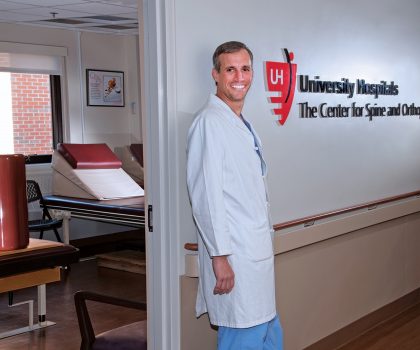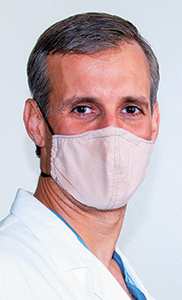Eliminating shoulder pain

By Ken McEntee
People of all ages can be needlessly burdened with ongoing shoulder pain.
“By the time they come to see me, many patients have been living with shoulder pain for months, or even years,” says shoulder specialist John “Marty” Leland, MD, orthopaedic shoulder and sports medicine surgeon at The Center for Spine and Orthopaedics at University Hospitals Geauga Medical Center. “That doesn’t have to be the case.”
Chronic shoulder pain is typically very treatable—and very often without surgery, Dr. Leland emphasizes.
“My job is to get people back to their lives, being active, with little or no shoulder pain again,” he says.
Chronic shoulder pain is commonly caused by a variety of conditions, depending on a person’s age and activity level.
Adults between 30 and 50 years old, Dr. Leland says, are vulnerable to rotator cuff irritation, which is also referred to as rotator cuff impingement syndrome or bursitis. The condition, which produces pain in front of the shoulder and/or in the biceps area, can be caused by overuse of the shoulder. Younger people are more likely to experience tearing in the labrum—a ring of cartilage on the shoulder socket. Older adults tend to be more commonly impacted by rotator cuff tears or shoulder arthritis.
Many people endure pain for fear of surgery. Surgery, however, is usually the last resort, Dr. Leland assures.
“I strongly recommend starting with conservative, non-operative measures to help people with their pain,” he explains. “For many people, that’s all that’s needed to get back to their levels of normal activity without pain.”
Non-operative, conservative treatments might include anti-inflammatory medications, physical therapy to build strength and increase range of motion, and steroid injections to decrease inflammation.
“If those remedies don’t work, I will typically order an MRI (magnetic resonance image) to get a better look at what’s going on in the shoulder,” Dr. Leland says. “If it’s necessary, the next step would probably be a shoulder arthroscopy—an outpatient procedure that takes about an hour to 90 minutes. Then you go home and probably wear a sling for about four weeks, and start to get back to your normal routine.”
Shoulder replacements, he says, are a rare option.
“Most of my surgical patients are very surprised by how little pain they experience and how wonderfully they do with an almost painless procedure,” he says.
“It’s because we’ve gotten very good at managing pain with a combination of nerve blocks done by our anesthesiologists. And I prescribe different pain medications that all operate on different pathways. By hitting all the different pain pathways, patients can go through something as complex as a shoulder replacement with almost no pain at all.”
“UH Geauga Medical Center provides the perfect combination of high-level specialization surgery with the love and care that a community hospital can provide,” insists Dr. Leland, who is on the board of directors of the Arthroscopy Association of North America and is an associate editor of the association’s medical journal.
“We specialize in a community approach. When you come in, everybody who works with you learns your name. Nobody goes through UH Geauga Medical Center and feels like they were just a number.”

The Center for Spine and Orthopaedics offers the latest advanced treatment options for bone and muscle disease and injuries of all kinds, and has a comprehensive orthopaedics team.
In addition to Dr. Leland, who manages shoulder and sports injuries and surgeries, Dr. Benjamin Silver specializes in total joint replacement and complex hip and knee reconstruction; Dr. Johnathan Macknin specializes in upper extremities and hand surgeries; Dr. Zachary Gordon specializes in spine surgery; and Dr. Lisa Brown specializes in pain management. The team works together to ensure patients have various treatment options and a complete care plan. In addition, The Center for Spine and Orthopaedics is open five days a week for walk-in appointments.
Same-day care is available at The Center for Spine and Orthopaedics. If you experience an orthopaedic injury such as an acute injury, ache, break or sprain, and need to be seen right away, you can call 440-901-5176. University Hospitals Geauga Medical Center is located at 13207 Ravenna Road, in Chardon. You can learn more by visiting UHHospitals.org/locations/uh-geauga-medical-center.
